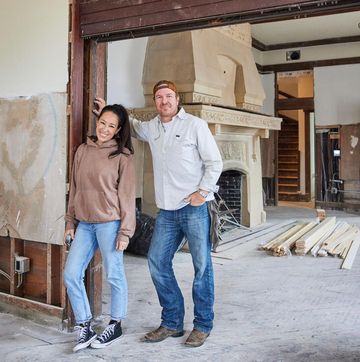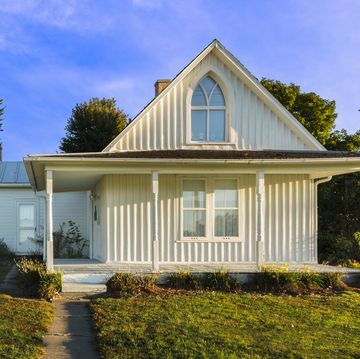Home inspections are a crucial part of the home-buying process, as they help to identify any potential safety or maintenance issues that might cost a pretty penny to fix down the road.
If you're unfamiliar with the process, it's when a home inspector goes over every inch of the home you'd like to buy, completing a report that indicates the conditions of the elements of a house, from windows to the HVAC system to electrical wiring. Ultimately, the report can factor into price negotiations; depending on your contract, the seller may have to address any issues from the home inspection, or you may be able to negotiate a lower price for the home to accommodate fixing those issues.
In other words: Home inspections are a fact of life. Unfortunately, home inspection scams do exist. To help protect you from such con jobs, we asked real estate agent Denis Smykalov of Wolsen Real Estate, Aaron Walker, a real estate agent at Coldwell Banker, and real estate expert Jasen Edwards, chair of the Agent Advice Agent Editorial Board, about home inspection red flags. Here's what you need to watch out for when booking a home inspection.
Cold Calls
You don't even need to be buying or selling a house to fall for a home inspector scam. Some of these cons target homeowners. "Be wary of fake home inspectors who claim that an inspection is required and offer to conduct it free of charge," warns Walker. "Some scammers even disguise themselves as fire or safety inspectors, showing up unannounced without prior appointments." Or, they might call following storm or other damage to the area, and say the city is requiring all homes be inspected. The real point of these free "inspections" is to gain entry and case your home for valuables. To stay safe, remember these three rules: You call them, they don't call you. Home inspections aren't free of charge. And no one claiming they're an inspector should be given access to your home without showing you state-issued certification.
Fake inspectors.
Even when you're doing the calling, you might stumble across an imposter looking to gain access to your home. "Scammers may claim to be licensed or certified home inspectors when they are not," says Smykalov. "Always verify the credentials of the inspector by checking with relevant licensing bodies or professional associations. Legitimate inspectors will be transparent about their qualifications and willingly provide proof when asked." You can search for home inspectors via professional organizations like the American Society of Home Inspectors and the International Association of Certified Home Inspectors.
During the hunt, says Smykalov, "Take the time to research and verify the credentials, reputation, and experience of the inspector or inspection company before hiring them. Read reviews, check their website, and ask for references from previous clients."
Biased Inspectors
Occasionally, even though a home inspector might be certified, they also might have shady deals in place with contractors. "It's important to ensure that the inspector you hire is entirely independent and not affiliated with any contractors or repair companies," says Smykalov. "Scammers may recommend specific contractors who are actually their associates, leading to inflated repair costs or unnecessary repairs." In fact, it's a conflict of interest for an inspector to offer to help a homeowner fix any problems identified during the inspection.
Ideally, you want to make sure your inspector is completely independent and neutral, with no vested interest in finding—or not finding—issues. While it's tempting to ask the real estate agent involved for inspector recommendations, if they're friends with the seller's agent, they may be tempted to push the inspection through, despite any issues, to help make the sale.
Incomplete or Falsified Inspections
While we'd like to most home inspectors take their jobs seriously, a few bad apples may take shortcuts, skipping over parts of the inspection—or worse. In the eagerness to finish the job, or help a seller close a deal, "some inspectors may ignore or downplay code violations, potentially leaving you with costly repairs or legal issues down the line," says Smykalov. One way to deter such situations is to join the home inspection yourself. First, says Smykalov, "Ask to see a sample inspection report from the inspector. A thorough and well-documented report will provide detailed information about the property's condition, including both positive and negative findings." Then, ask for a list of what the inspector will be checking during your inspection.
Finally, tag along on the inspection, following along the checklist. You don't want to interrupt the inspector at work too much, but being there "allows you to ask questions, gain a better understanding of the property's condition, and ensure that the inspector covers all necessary areas."
Edwards agrees, it's key to attend the inspection. "Make sure you are present to verify that the inspector is truly performing a thorough assessment of your property," he says.
Charging for Add-Ons Without Consent
There are different levels of home inspection services, and you can upgrade your inspection to include specialties, such as testing for radon or searching for mold. Naturally, these extra services command additional fees. If you agree to them ahead of your home inspection, that's not a problem. But in some cases, a home inspector might toss these special services into your inspection without your approval, skyrocketing the cost of the inspection as it's happening. "To avoid getting yourself into these situations, just make sure you ask for a detailed scope of work," says Edwards. Agree to that scope of work before the inspection—ideally in writing—so that you'll only be charged for those services. With a little preparation, your home inspection should be smooth sailing that gets you one step closer to owning the place of your dreams.












